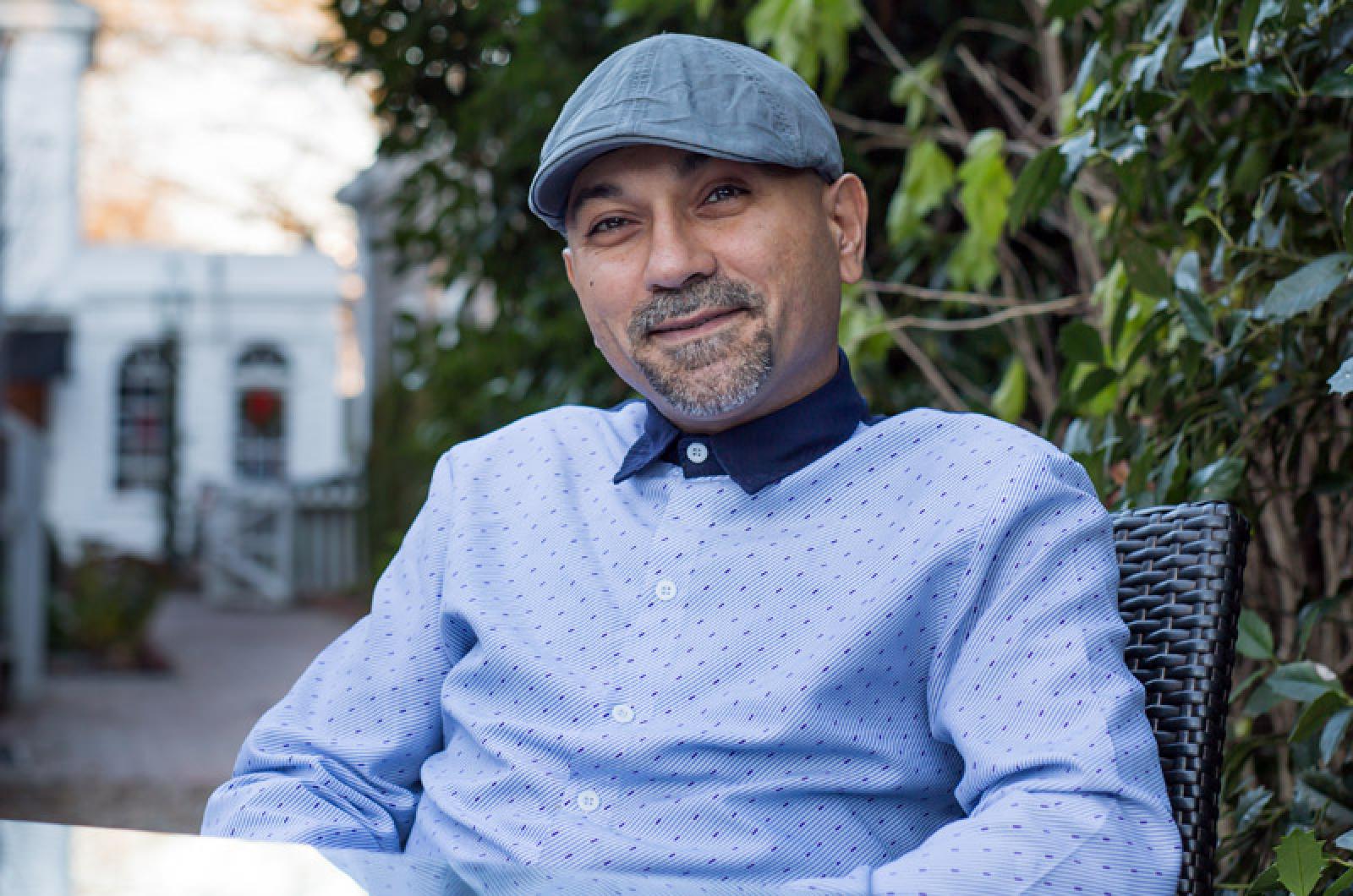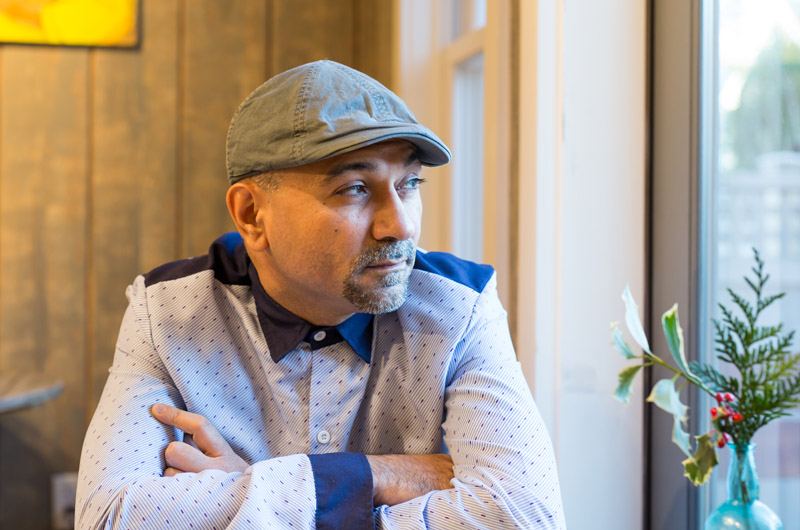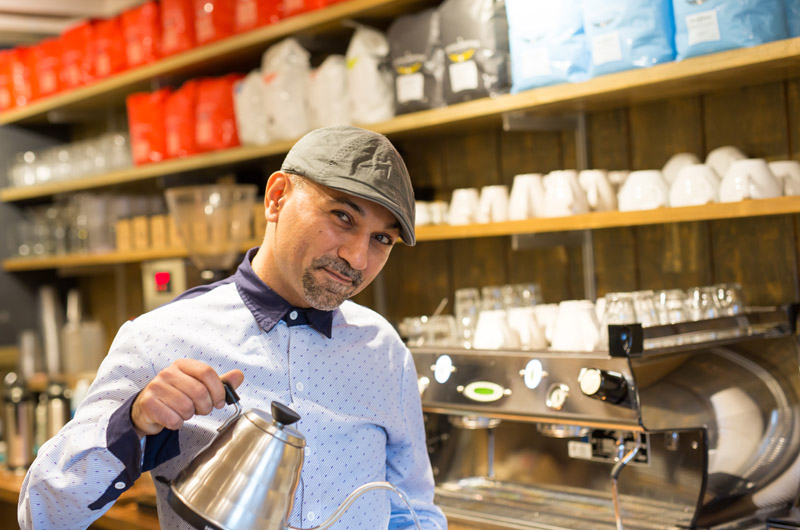While you were sleeping your barista was working hard. Not merely grinding the beans, setting up the pour over station and practicing latte art, although he was doing that too. No, in this case your barista Mikhail (Misha) Sebastian was traveling to Ethiopia and Rwanda to visit the birthplace of coffee. It was a pilgrimage to meet the people who pick this coffee, to touch the soil and breathe the high altitude air essential to creating specialty coffee. It was also a way of saying thank you to the bean that not only changed his life, but in a way saved it.
Misha works at Behind the Bookstore Cafe in Edgartown. He arrived last spring from Los Angeles and nearly every day he can be found behind the counter creating both coffee and a coffee community. Even with a long line out the door on a busy summer day, Misha does not appear to sweat. Perhaps the secret is his clothes, a mixture of fashion and whimsy that does not allow for such mundane activities as sweating. They also give him an air of a jolly, perfectly caffeinated elf — not too manic, not too mellow — who would like nothing more than to sit for hours with you discussing coffee. Which on a crisp day recently he did, in between serving customers and fielding questions from the small off-season staff at the cafe.
“Misha, what grind for the Kenyan, seven or eight?”
“Seven, definitely seven.”
He pours himself and his interviewer cappuccinos, sets them down on the table and then sits back, a smile already forming. He has a story to tell. The interview is ostensibly to be about his trip to Ethiopia and Rwanda, to hear what it was like in these countries. But just as there is no way of truly understanding the journey of a coffee bean, from the pickers living in poverty in the hills of Ethiopia to the cup in your hand, the journey of your barista can also be a complete mystery.
Perhaps it is time to pour a cup of dark coffee and settle in. The tale begins in Armenia, ends in Rwanda and in between makes stops at U.S. detention centers, languishes in exile in Samoa and stars Christiane Amanpour as a white knight riding to the rescue. It is also about coffee.
Pass the biscotti.
Misha is 42 and of Armenian descent although he grew up in Azerbaijan. He came to the United States about 20 years ago, soon after the collapse of the Soviet Union, as an interpreter for a government official of Turkmenistan who was having a heart operation in Houston, Tex. Misha decided to stay in the U.S. on that trip, a spur of the moment decision made by a young man who had no idea about visas and immigration laws.
“At that time I had like $30 in my pocket,” he recalled.
He was also illegal, even though fleeing the breakup of the Soviet Union, where ancient ethnic animosities began to flare up among the satellite republics, in particular his home countries of Azerbaijan and Armenia. At the time he was traveling with a passport from the Soviet Union — he had not updated his status — but now it was no longer valid because the Soviet Union did not exist. When he was told by U.S. immigration authorities that he had to leave the country, it was impossible because he didn’t have a country of origin and so couldn’t get a passport.
“I went to Russian consulate and they said you are not our citizen,” he said. “Azerbaijan, because of the war with Armenia, even though I had my birth certificate from there, they denied my citizenship. Then Turkmenistan denied me. I didn’t really want to get a Turkmenistan citizenship but I needed some kind of passport to leave, but Turkmenistan said you are not our citizen. So I became stateless.”
It was a Catch-22 that even Joseph Heller hadn’t thought of. The cycle ended in a deportation center, where Misha spent six months before being let out, provided he look for ways to leave the country and report every three months to immigration authorities. But no country would take him or grant him asylum. This went on for 11 years. It was during this time that he discovered coffee.
Perhaps it was all the late nights writing letters to countries all over the world seeking asylum or the constant visits to the immigration offices, but he began consuming coffee like a man without a country, which is to say in great quantities. He was living in Los Angeles now and spending a lot of time at a cafe called Tiago in Hollywood. But he wasn’t really tasting the coffee. Everyone kept saying what great coffee the place had but he didn’t notice anything other than it helped him work longer hours.
Then the owner, now a friend, got wind of Misha’s apparent lack of a discerning palate and poured him a cup of Ethiopian coffee and demanded that he take a moment to notice the taste and texture.
“When I tried that coffee I was like, oh man, did you put something in that coffee? He was like no, what do you taste? I said I taste blueberry, strawberry, blackberry and a little bit of pineapple, and there was a roast flower flavor. And he was like, yes that is the coffee from Ethiopia. That was exactly the flavors.”
And so began a love affair with coffee. He started working at Tiago, and in his spare time studied coffee, the making of it, the growing of it, the art of it.
“I got 10 attempts a day to waste milk and espresso,” he said of his first attempts at what is known in the business as latte art. “After that I had to stop and wait until the next day.”
He also built up his palate by eating more honey and grapefruit and other flavors found in the coffee he was tasting. Then he got really serious and began taking courses, going to barista training camps, and even studying with the legendary Charles Babinski.
“He took second place in the U.S. barista championships,” Misha explained. Actually, Mr. Babinski is currently the reigning U.S. barista champ.
Misha had found a purpose even if he had not found his country yet. Then one day he decided to take a vacation. For a time he had worked at a travel agency and with his job perks he had traveled as far as he could go within the country — to Alaska, Hawaii, even to Puerto Rico, peering over the edge of the United States borders but unable by law to step one foot further. But where to go next? He chose American Samoa, the furthest point of U.S. territory. He arrived there in December 2011.
At the end of the vacation, when he tried to return to the U.S., the authorities in Honolulu stopped him. There had been a mistake with the travel documents issued by American Samoa, and it was also discovered that Misha had taken a quick side trip to Western Samoa which is not part of the U.S. Immigration authorities said he had voluntarily deported himself. He was sent back to Samoa to live in a sort of limbo existence with no money, no friends and only the clothes in his small suitcase.
“Samoa is by the equator, it’s over 90 degrees every day. It becomes hot by 6 a.m., like an oven. The house didn’t have air conditioning. You cannot go outside because it is too hot, but inside is hotter,” he said.
He also couldn’t get a job without the necessary papers. The Samoan government took pity on him — after all it was their mistake with his travel papers — and paid a local family with eight children to let him live with them. But he spent most of his time at the local McDonald’s, using the free WiFi to contact anyone and everyone in order to find a way out of his situation.
Months turned into a year. He begged people who visited the island in yachts to let him hide on board, and he even considered jumping into the ocean and letting the waves decide his fate. Then he got mad. At Hillary Clinton. It was December 2012 and the United Nations was promoting an international day for human rights.
“Hillary Clinton at that time was going to Geneva and giving a speech to the United Nations High Commission for Refugees about stateless people,” he said. “Her speech was about Kuwait, Nepal, Myanmar, Estonia, all those countries and how they need to implement a law protecting stateless people, granting citizenship and legalizing the status of their stateless people. And I got so pissed. Why are you putting your nose somewhere else and not solving the problem in your own country?” he said.
So he wrote Mrs. Clinton a long email. Her office read it. Now they were pissed at him. But Misha kept up his campaign, tweeting, texting and emailing messages across the endless sea of the internet. He became a local celebrity of sorts, a small stateless man of Armenian descent living in exile on Samoa, an island of very big people. The United Nations commission for refugees even sent a film crew to document his situation. Then Christiane Amanpour’s office contacted him and she put his story on CNN international.
“She put me on CNN twice,” Misha said, calmly sipping his cappuccino.
All the publicity finally worked. After 17 months he was allowed back into the United States in March 2013 and given humanitarian parole. His journey to U.S. citizenship will still take another four or five years, but with his new status Misha was finally able to travel internationally. Which brings the story to his trip last month to Ethiopia, the birthplace of coffee, and then to Rwanda.
“I knew how coffee was processed but I wanted to see it with my eyes,” he said. “Coffee actually changed my life. It was very emotional for me. I went to farms, 9,000 feet above sea level, down the bumpy roads, the place is so lush, with coffee trees everywhere, baboon monkeys sitting on the side of the road.”
In Rwanda he also toured the genocide memorial, guided by a Tutsi taxi driver who had lost four family members during the civil war in which over a million Tutsi and Hutu people were killed. But he also discovered a country that was moving forward, and he fell in love with it, the stateless man drawn to this place that had seen so much horror but was working hard to rebuild. His dream now is to return and start a coffee bar there, in the hotel where he stayed.
“In all coffee producing countries the good quality coffee gets shipped out, and only low quality remains,” he said. “I want to create a place so people from Rwanda can taste the great product of their own mothers and fathers and the kids who work so hard on the farms there.”
He finishes his cappuccino. A few customers have wandered in. One asks for a latte, and the other person asks Misha what he recommends. He stands and claps his hands together.
“Oh, I have the perfect thing. It’s from Ethiopia. You will love it.”






Comments (3)
Comments
Comment policy »